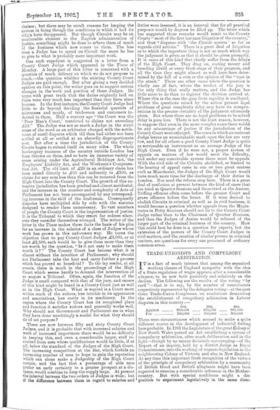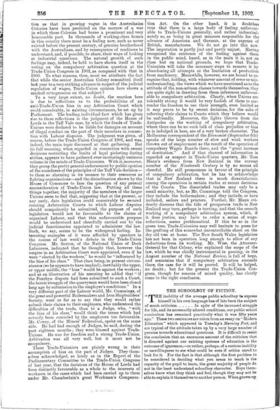TRADE-UNIONISTS AND COMPULSORY ARBITRATION.
IT is a fact of much interest that among the organised working classes of England sympathy with the idea of a State regulation of wages appears, after a considerable advance, to be now both positively and relatively on the decline. The following are the results of the voting "by card "—that is to say, by the number of constituents respectively represented by the delegates voting—at the past three Trade-Union Congresses, on resolutions demanding the establishment of compulsory arbitration in Labour disputes in this country :— 1900. 1901. 1902.
Against 939,000 676,000 961,000 For 246,000 366,000 303,000
There were circumstances which seemed to make a quite different course in the development of industrial feeling here probable. In 1901 the Legislature of the great Colony of New South Wales passed an Act establishing a system of compulsory arbitration, after much deliberation and in the light—though by no means decisively encouraging—of the Report of an inquiry, held by a district Judge as Royal Commissioner, into the working of cognate legislation in the neighbouring Colony of Victoria and also in New Zealand. At any time this important fresh recognition of the virtues of the principle of compulsory arbitration by a community of British blood and British allegiance might have been expected to exercise a considerable influence in the Mother- country. But with special confidence might a dis- position to experiment legislatively in the same direc- tion as that in growing vogue in the Australasian Colonies have been predicted on the morrow of a war in which those Colonies had borne a prominent and very honourable part. In thousands of working-class homes in this country there must be a feeling now, such as never existed before the present century, of genuine brotherhood with the Australians, and by consequence of readiness to understand, and, if possible, to share, their ways of looking at industrial questions. The natural growth of such feelings may, indeed, be held to have shown itself in the voting on the compulsory arbitration question at the Trade-Union Congress in 1901, as compared with that in 1900. To what reasons, then, must we attribute the fact that while the senior Australian Colony committed itself last year to a very striking advance in respect of the judicial regulation of wages, Trade-Union opinion here shows a marked retrogression on that subject ? To a very large extent, no doubt, the reaction here is due to reflections as to the probabilities of an anti-Trade-Union bias in any Arbitration Court which could conceivably, in existing circumstances, be set up by Parliament. The leading individual fact which has given rise to these reflections is the judgment of the House of Lords in the Taff Vale case, by which the funds of Trade- Unions were declared to be liable for damages on account of illegal conduct on the part of their members in connec- tion with Labour disputes. The judgment was given, of course, before the Trade-Union Congress of 1901, and was, indeed, the main topic discussed at that gathering. But its full meaning, when regarded in connection with recent decisions restricting the limits of legal picketing during strikes, appears to have gathered ever-increasingly ominous volume in the minds of Trade-Unionists. With it, moreover, they group the pretty general endorsement by public opinion of the soundness of the principles of the Taff Vale decision— to them so alarming in its menace to their resources as fighting organisations—and the disinclination shown by the House of Commons to face the question of any general reconsideration of Trade-Union law. Putting all these things together, the majority of tbe members of the larger Unions seem to feel that, supposing that at the present, or any early, date legislation could conceivably be secured creating Arbitration Courts to which Labour disputes should compulsorily be submitted, the purpose of such legislation would not be favourable to the claims of organised Labour, and that this unfavourable purpose would be understood and cheerfully carried out by the judicial functionaries appointed to administer the law. Such, we say, seems to be the widespread feeling. In- teresting examples of it were afforded by speakers in the course of last week's debate in the Trade-Union Congress. Mr. Sexton, of the National Union of Dock Labourers, indicated that he thought that, however the umpire in an Arbitration Court were appointed, even if he were "elected by the workers," he would be "influenced by the bias of his class." That class being, in present circum- stances (so he appears to have implied), inevitably the upper, or upper middle, the " bias " would be against the workers; and as an illustration of his meaning he added that "if the Penrhyn dispute had been submitted to such a Court, the heroic struggle of the quarrymen would have been closed long ago by submission to the employer's conditions." In a very different part of the Labour world, Mr. Cummings, of the great and powerful Boilermakers and Iron Shipbuilders' Society, went so far as to say that they would rather submit their claims to their employers, who understood the difficulties of the trade, than to a Judge, who, "with the bias of his class," would think the terms which had actually been conceded by the employers too favourable. Mr. Cowey, of the Miners' Federation, spoke on the same side. He had had enough of Judges, he said, during the past eighteen months ; they were biassed against Trade- Unions. He was for freedom and a strong Trade-Union. Arbitration was all very well, but it must not be compulsory. These Trade-Unionists are plainly wrong in their assumption of bias on the part of Judges. They them- selves acknowledged, so lately as in the Report of the Parliamentary Committee to the Trade-Union Congress of last year, that the decisions of the House of Lords had been distinctly favourable as a whole to the interests of workmen in the cases which had been carried up to them under Mr. Chamberlain's great Workmen's Compensa- tion. Act. On the other hand, it is doubtless true that there is a large body of feeling unfavour- able to Trade-Unions generally, and rather indiscrimi- nately so, as being in great measure responsible for the advance of American and German, at the expense of British, manufactures. We do not go into this now.
The imputation is partly just and partly unjust. Having recognised the existence of the feeling against them in the public mind, based, as in the main it is, not on class but on national grounds, we hope that Trade. Unionists will take the necessary steps to remove it by abandoning all attempts at the limitation of production from machinery. Meanwhile, however, we are bound to re- cognise that, holding, with whatever amount of error or mis- understanding, the views which we have mentioned as to the attitude of the non-artisan classes towards themselves, they are quite right in drawing from them inferences unfavour- able to compulsory arbitration. Clearly, when Unions are tolerably strong it would be very foolish of them to sur- render the freedom to use their strength, even limited as it may prove to be by recent decisions, for the sake of referring their claims to Courts which they believe would be unfriendly. Moreover, the lights thrown from the Antipodes on the working of compulsory arbitration, where there can be no such talk of class prejudice or bias as is indulged in here, are of a very broken character. The Melbourne correspondent of the Economist (September 6th) speaks of the large number of slow and weak workers thrown out of employment as the result of the operation of compulsory Wages Boards there, and the "great increase of destitution." And if that channel of information is regarded as suspect in Trade-Union quarters, Mr. Tom Mann's evidence from New Zealand in the current number of the Nineteenth Century is by no means all cheerful. He still pronounces in favour of the principle of compulsory arbitration, but he has to acknowledge that in New Zealand there is much dissatisfaction among the operatives in certain trades at recent decisions of the Courts. The dissatisfied trades may only be a small minority, but, as Mr. Cummings told the Congress, they include the boilermakers ; and they include, or have included, sailors and printers. Further, Mr. Mann evi- dently discerns that the tide of prosperous trade in New Zealand may turn, perhaps is turning, and that the smooth working of a compulsory arbitration system, which, if it does justice, may have to order a series of wage. reductions, seems problematical. If this be so in the green tree, Trade-Unionists may well hesitate to press for the grafting of this somewhat uncontrollable shoot on the dry old tree at home. The New South Wales legislation has not been in operation long enough to allow of any deductions from its working. Mr. Wise, the Attorney. General for that Colony, who explained the scope of the law, which he was chiefly instrumental in passing, in the August number of the National Review, is full of hope, and maintains that if compulsory arbitration succeeds there, the case for it will be proved. It will be helped, no doubt ; but for the present the Trade-Union Con- gress, though for reasons of mixed quality, has clearly come to the right conclusion.







































 Previous page
Previous page